Coordinación
Una coordinación sólida puede evitar vacíos y duplicaciones en las respuestas humanitarias, así como garantizar que los PTM complementen otros tipos de asistencia. Sin embargo, el informe del «Estado Global de los Programas de Transferencias Monetarias» de la CALP Network muestra que la coordinación de la asistencia en efectivo es vista como débil y ad hoc, y que esto está teniendo graves repercusiones operativas.
Los donantes, las ONG y los líderes de los grupos de trabajo de transferencias monetarias (GTM) han pedido claridad sobre tres temas principales relacionados con la coordinación de la asistencia en efectivo:
- Quién debe ser responsable de asegurar una coordinación eficaz de la asistencia en efectivo;
- Cuál es la función y el mandato de los grupos de trabajo de transferencias monetarias, incluso en relación con las transferencias monetarias multipropósito;
- Cómo se debe dotar de recursos a la coordinación de asistencia en efectivo.
Tenemos que basarnos urgentemente en lo que funciona y proporcionar claridad a nivel mundial sobre las preguntas arriba mencionadas, adaptándonos a los diferentes contextos. Hace mucho tiempo que se deberían haber tomado decisiones claras basadas en necesidades operativas y no en la política de las agencias.
Prioridades actuales
El objetivo de la CALP Network es contribuir a seguir progresando en este tema en tres niveles: apoyar a los grupos de trabajo de transferencias monetarias a nivel regional; contribuir a soluciones prácticas para la coordinación de la asistencia en efectivo a nivel mundial; y convocar una discusión basada en la evidencia sobre temas clave, destacando puntos de decisión críticos y oportunidades de progreso.
Contenido destacado

Cash Coordination Tip Sheet
Guidelines and Tools
This tip sheet sets out established best practice, key guidance and resources for all aspects of cash coordination, intended as a clear, accessible and action-oriented guide for those engaged in coordination of cash and voucher assistance (CVA) at the field level.

Introducing the Cash Coordination Tip Sheet
Webinar
The CALP Network has developed a tipsheet setting out established best practice and key guidance and resources for all aspects of cash coordination, intended as a clear, accessible and action-oriented guide for those engaged in coordination of cash and voucher assistance at the field level.

Cash Coordination: A proposal from members in MENA
Blog Post
Earlier this year the CALP Network undertook regional consultations to explore options for cash coordination. This blog lays out recommendations from participants from the Middle East and North Africa who sketched out what cash coordination, and coordination more broadly, could look like in future to support a more effective, efficient and accountable response.
Últimos recursos

Public Health Agencies and Cash Transfer Programmes: Making the case for greater involvement
Policy paper
This report examines the case for greater involvement by public health agencies in cash transfer schemes, a form of welfare assistance. It seeks to identify opportunities, obstacles and actions that might support greater involvement. The issue arises because cash transfer schemes are an increasingly...

IASC Evaluation of the Humanitarian Response in South Central Somalia 2005-2010
Case Study
This independent report presented by DARA confirms that humanitarian aid in Somalia has saved thousands of lives between the years 2005 to 2010. The report is based on an evaluation of the humanitarian response in south-central Somalia and is one of the most comprehensive evaluations of aid in Somalia...
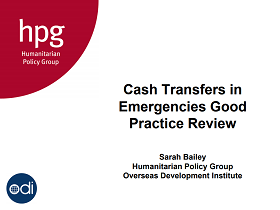
Cash Transfers in Emergencies Good Practice Review: Presentation
Presentation
Powerpoint presentation on the then-forthcoming Good Practice Review on cash transfer programming in emergencies.
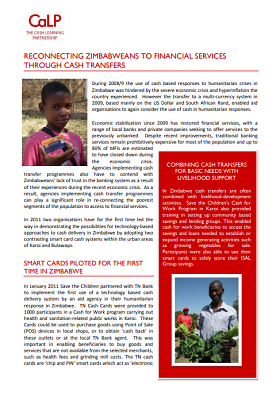
The CALP Network Newsletter supplement Zimbabwe cards Aug 11
Report
Supplement to the CALP Network August 2011 newsletter, focusing on the topic of ‘Reconnecting Zimbabweans to financial services through cash transfers’. Includes sections on: Piloting of smart cards in Zimbabwe Combining cash transfers for basic needs with livelihood support

Planning and implementing cash transfers in emergencies: Practical insights from Pakistan
Report
Access The Report Here The use of cash transfers and vouchers, or together ‘cash-based responses’, has grown remarkably in recent years. Cash transfers provide beneficiaries with money, while vouchers ensure access to food for a predefined quantity or value in identified outlets. While there is a...
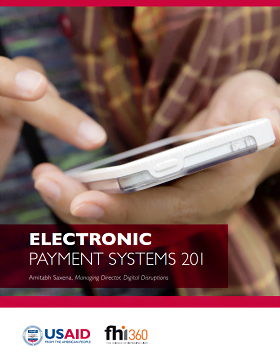
Electronic Payment Systems 201
Guidelines and Tools
Disruptive innovation in the payments sector—and indeed the retail financial services industry—does not occur frequently. This is partly due to the dominant position of the incumbent players (primarily banks and payment networks), and partly due to the nature of the sector itself: as they relate to...
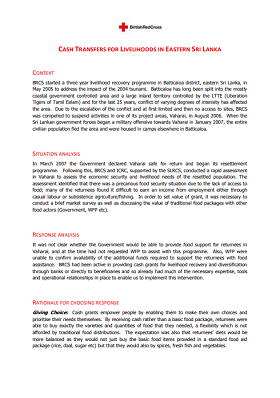
Cash transfers for livelihoods in Eastern Sri Lanka
Case Study
This case study looks at the British Red Cross’ intervention in Eastern Sri Lanka, following the Tsunami, whereby resettled households were provided with the cash equivalent of a food ration in order to bridge the gap before the next harvest and resumption of livelihood activities. The paper discusses...
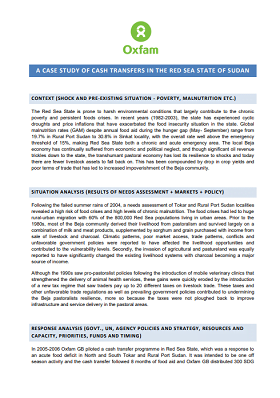
A case study of cash transfers in the Red Sea State of Sudan
Case Study
This case study looks at an Oxfam cash for work and cash for recovery programme in the Red Sea State of North Sudan. The report details the context, the response analysis, programme choice rationale, programme implementation details, the impacts and benefits, and highlights the lessons learned.
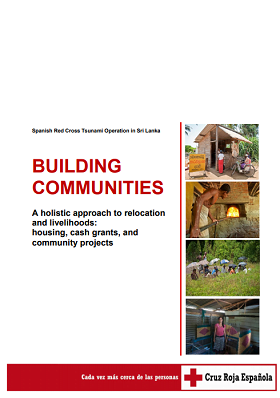
Building Communities: A holistic approach to relocation and livelihoods: housing, cash grants, and community projects
Case Study
This case study looks at the Spanish Red Cross’ housing reconstruction programme which took place between 2007-09 in Sri Lanka, following the devastating Tsunami. In addition to housing this intervention had two main approaches: household level grants for re-starting, supporting the strengthening or...
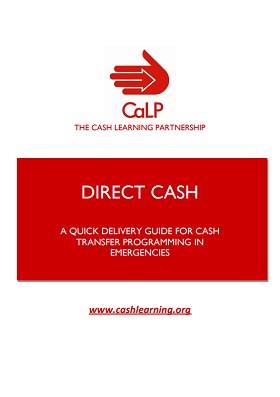
Direct cash – A quick delivery guide for cash transfer programming in emergencies
Guidelines and Tools
A Quick Delivery Guide to delivering money directly (‘direct cash’ or ‘cash in envelopes’). Prepared as a practical tool, this guide provides a brief synthesis of the necessary preconditions and advantages and disadvantages of using direct cash. It also provides practical implementation tips.

An Evaluation of Save the Children’s Cash Transfer Project in Aweil East County, Northern Bahr el Ghazal State, South Sudan
Report
Since April 2009, Save the Children have been implementing an ECHO-funded cash transfer project in Baac Payam, Aweil East County. The specific objective of this project has been to improve dietary diversity and nutritional outcomes among the targeted households that inhabit a part of Sudan which has some...
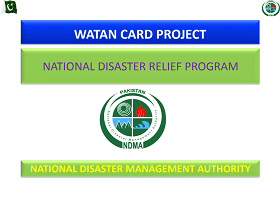
Watan Card Project – Pakistan National Disaster Relief Program
Presentation
Presentation to the CALP Network 4th Global Learning Event (Bangkok, February 2011) from the National Disaster Management Authority of the Government of Pakistan. The presentation reviews the WATAN card cash transfer programme implemented by the Government to transfer money to flood affected people. The...
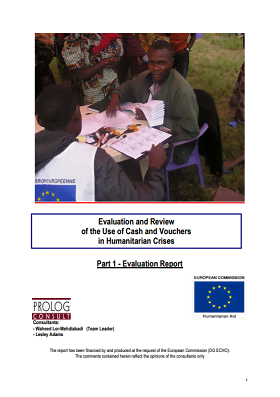
Evaluation and Review of the Use of Cash and Vouchers in Humanitarian Crises
Report
This report is the second of two reports commissioned by DG ECHO to support the development of a coherent policy regarding the use of cash and vouchers in humanitarian crises. The first report evaluated DG ECHO’s partners’ use of cash and vouchers. This second report reviews cash and voucher...

Niger: Unconditional cash transfers in Tanout
Case Study
This case study documents the one time unconditional cash transfer programme carried out by the British Red Cross, for households vulnerable to food insecurity, as part of its overall emergency and recovery project following the 2004/5 Food crisis in Niger. It details the context, situational analysis,...
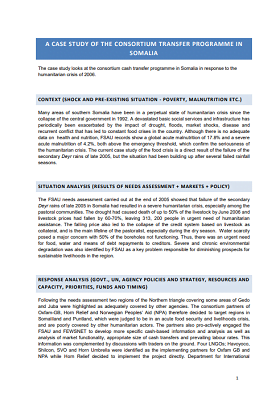
A case study of the consortium transfer programme in Somalia
Case Study
This case study looks at a consortium cash transfer programme in Somalia in response to the humanitarian crisis of 2006. Details of the context, response analysis and rationale for choosing cash for work and direct cash relief interventions are given along with the programme summary. Perceived impacts and...

Hard Cash in Hard Times: Cash transfers versus food aid in rural Zimbabwe
Case Study
This case study looks at Concern Worldwide’s pilot project to provide cash, instead of traditional food aid, to food insecure communities in Zimbabwe. The document briefly describes the conditions making it suitable for such a response, positive outcomes for the cash recipients, the cost effectiveness,...

Vouchers – A quick delivery guide for cash transfer programming in emergencies
Guidelines and Tools
A quick delivery guide to using vouchers to implement a market-based emergency response. Prepared as a practical tool, this guide provides a brief synthesis of the necessary preconditions and advantages and disadvantages of using vouchers. It also provides practical implementation tips.
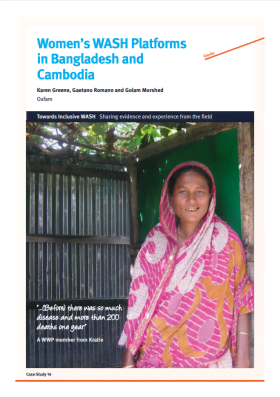
Women’s WASH Platforms in Bangladesh and Cambodia
Case Study
Oxfam’s multi-country portfolio is located in more than 100 remote rural communities in six countries and is funded by AusAID’s Civil Society Organisation WASH Fund. The water, sanitation and hygiene (WASH) projects in Bangladesh and Cambodia deliver multiple outcomes including improving water and...
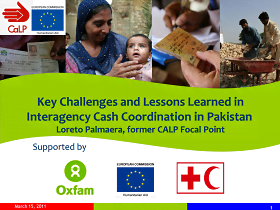
Key Challenges and Lessons Learned in Interagency Cash Coordination in Pakistan
Presentation
A presentation from the CALP Network’s former focal point Loreto Palmaera on ‘Key Challenges and Lessons Learned in Interagency Cash Coordination in Pakistan’

Walking the Talk: Cash Transfers and Gender Dynamics
Case Study
Concern Worldwide (Concern) and Oxfam GB (Oxfam) jointly commissioned this report to look at the impacts of cash transfers (CTs) on gender dynamics both within households and communities. This report was commissioned because of the agencies’ concerns that while CTs, now being used in many different...